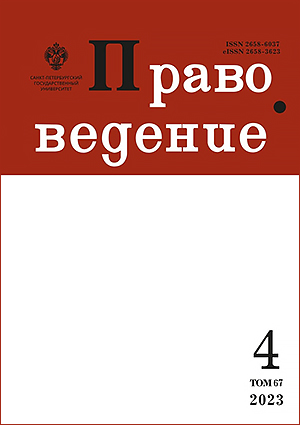Sanctions and their influence on contractual obligations in comparative law perspective
DOI:
https://doi.org/10.21638/spbu25.2023.406Abstract
The article analyzes the problems of sanctions restrictions and prohibitions and their influence on contractual obligations. Sanctions objectively and by their nature affect the economy as a whole and therefore influence on contracts concluded by private persons. However today the study of this issue is carried out mainly in the context of public law but not private law. In English law the problem of legislative restrictions and prohibitions and their influence on the dynamics of a contract has been analysed for more than a century in the context of the doctrine of frustration of purpose of contract. And English law provides the termination of the contract due to its frustration because of the imposed sanctions. The English courts carefully apply this approach and use it only when under the influence of legislative restrictions and prohibitions the very sense of contract changes. It can’t be applicable when just the motives of the party to enter into the contract are not realized. This allows, on the one hand, to protect the interested parties to the contract and on the other hand not to destabilize the civil circulation. In Russian law the article 451 of the Civil Code of the Russian Federation is to decide the problem of the influence of sanctions on contractual obligations. However throughout all the time of existence of this rule Russian courts demonstrate a negative attitude towards it and don’t apply it when it is an adequate regulator of the relations of the parties. Today the Russian law enforcement practice allows the party of the contract only to be released from liability for violation of its obligation on the basis of paragraph 3 of art. 401 of the Civil Code of the Russian Federation in the case when such breach occurred due to the enforcement of sanctions restrictions and prohibitions. At the same time, it is worth to mention that this approach of courts is not unambiguous: often courts refuse to recognize sanctions as a force majeure. And this doesn’t contribute to clarity to the law enforcement the practice of application the rules of paragraph 3 of frt. 401 of the Civil Code of the Russian Federation and protecting the parties to the contract from the influence of external circumstances that they can’t either control or prevent.
Keywords:
contract, contractual obligations, change of position, frustration of purpose, force majeure, termination of a contract
Downloads
References
Agarkov, Mikhail M. 2012. Selected papers on civil law. In 2 vols. Vol. 2: The general doctrine of obligations and its individual types. Мoscow, Statut Publ. (In Russian)
Beaucillon, Charlotte (ed.). 2021. Research handbook on unilateral and extraterritorial sanctions. Cheltenham, UK, Northampton, MA, USA, Edward Elgar Publishing Limited.
Campbell, Henry. 1918. The Law of War and Contract, Including the Present War Decisions at Home and Abroad. Oxford, Oxford University Press.
Dernburg, Genrikh. 1911. Pandects. Translation from German. Ed. by P. Sokolovsky. Vol. 2. Law of obligations. 3rd ed. Moscow. (In Russian)
Karapetov, Artem G. (ed). 2017. Contract law and law of obligations (general part): clause-by-clause commentary to articles 307–453 of the Civil Code of the Russian Federation. [Electronic edition. Edition 1.0]. Moscow, M-Logos Publ. (In Russian)
Keshner, Maria V. 2015. Economic sanctions in modern international law. Moscow, Prospekt Publ. (In Russian)
Mejer, Dmitrii I. 1897. Russian Civil law. St. Petersburg: Mejer, Dmitrii I. 1897. Russian Civil law. SaintPetersburg, D. V. Chichinadze Publ. (In Russian)
Petrova, Daria S. 2017. Doctrine of Frustration: Application, Characteristics and Consequences under English Law. Vestnik ekonomicheskogo pravosudiia RF 10: 115–144. (In Russian)
Petrova, Daria S. 2022. Frustration of contractual purpose under Russian law. Comparative and Legal Study. Мoscow, Statut Publ. (In Russian)
Poldnikov, Dmitrii Iu. 2015. The origins of the clause of constancy of circumstances (clausula rebus sic stantibus) in the doctrine of ius commune jurists. Vestnik Moskovskogo universiteta. Ser. 11. Pravo 3: 22–34. (In Russian)
Subedi, Surya P. (ed.). 2021. Unilateral Sanctions in International Law. Oxford, London, New York, New Delhy, Sudney, Hart Publishing, Bloomsbury Publishing Plc.
Zeits, Aleksandr G. 1928. The influence of a change of conditions to the force of contracts. Irkutsk, Izd. Irkutskoi sekеktsii nauchnykh rabotnikov Publ.
Downloads
Published
How to Cite
Issue
Section
License
Articles of "Pravovedenie" are open access distributed under the terms of the License Agreement with Saint Petersburg State University, which permits to the authors unrestricted distribution and self-archiving free of charge.




